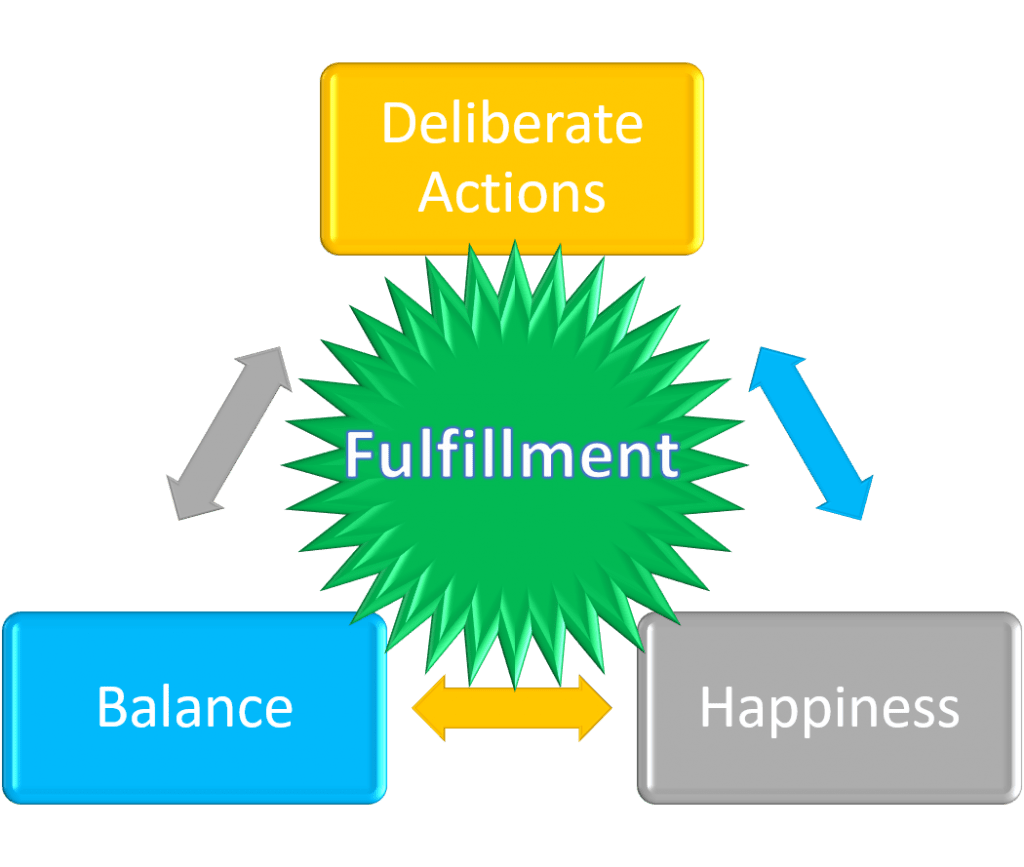The internet is full of articles that claim you can solve your problem with a handful of “easy steps”. Weight loss is a prime example. One article claims three easy steps to lose weight: Cut back on sugars and starches, eat protein, fat and vegetables and lift weights three times per week.
If you look closer at these articles, they have two interesting things in common: they are both focused on things that will make us happier and they all include a deliberate action.
These commonalities are not unique to internet articles. Over the years I have studied a wide variety of topics from organizational development to aromatherapy. As I researched and put my knowledge into practice, I noticed that there seemed to be some common principles no matter what the topic. For example, one author who studies and practices Taoism noted that people should work at a rate of about 70-80% of their capacity to maximize their long-term effectiveness. In Scrum, a framework commonly used in software development, teams are encouraged to begin by taking on about 70% of what they think they can accomplish in a Sprint (a period of two to four weeks where the team can work without outside interruption).
Eventually, I began to believe that there may be a set of universal principles that could help a person succeed in any situation and began to look for these commonalities. On several occasions, I attempted to compile the principles into lists but they would quickly grow long which made them difficult to use in a real-life situation. I wanted something short and sweet that could be used to evaluate a decision on the fly. If I was having trouble keeping my own principles straight, how could I expect others to be able to use them effectively?
One day, when I was developing strategy for Organizational Engineering, the pieces all fell in place. Three principles seemed to magically appear on my whiteboard that encompassed all of the other principles and practices I was trying capture. What are they you ask?
The first two, deliberate actions and happiness were listed in the weight loss example but one important element was missing: balance.
All three of the principles are demonstrated in the 70% rule example discussed above and all three principles must be observed harmoniously which happens to be principle #3 on the list. Of course, these terms on their own aren’t principles. The full principles are listed below:

When used together, these principles significantly increase our chances of leading a fulfilling life. Let’s look at each of the principles in more details.

Deliberate Actions:
There are two parts to a deliberate action: intent and follow through. As David R. Hawkins M.D., Ph.D. points out in his book “>Happier that if we ask why things happen or why we want them, we can almost always follow up with another why. But, when we ask why we want to be happy, there is a single correct answer: It is in our nature to want to be happy.
Intent requires conscious thought. Action without intent or conscious thought leaves our lives to chance and greatly reduces the probability of leading a fulfilling life. It’s like taking your hands off the steering wheel, closing your eyes and pushing the gas pedal. You might be fine for a few seconds but at some point, you will end up somewhere you don’t want to be.
Taking deliberate actions can be simple or complex. L. David Marquet, author of Happiness:
Happiness is more than just having fun and I use the term synonymously with fulfillment. Fulfillment is a long-term well-being that results from all of our needs being met (think Maslow’s hierarchy).
If you subscribe to this theory that happiness is the point of life, it would stand to reason that all of our actions should be focused on things that will make us and those around us more fulfilled. The specifics about what makes us happy differ somewhat for each person and that creates some challenges but that is a topic for another day.

Balance:
As we see in Maslow’s hierarchy, there are several elements of our lives that must be addressed to achieve higher levels of fulfillment. We live in a universe where time and resources are limited so, if we expend too much of our time or resources on any one element of our lives, we end up neglecting another area and will feel the pain physically, emotionally or spiritually.
The same holds true for fulfillment. We need a combination of short-term enjoyment and long-term well-being to be fulfilled. For example, many “overachievers” sacrifice relationships and personal wellbeing to accomplish their goals. They put so much pressure on themselves that even though they may have the fancy new car and big house, they are stressed and lack satisfaction in other areas of their lives. Many “underachievers” focus too much on short-term satisfaction and make decisions that are detrimental in the long run such as constantly binging on Netflix, going to bars every night or regularly using drugs. While they may seem happy in the moment, they too are neglecting needs that will bring them long-term happiness.
Principle to Practice:
We make thousands of decisions every day. Stopping to think about these principles for every decision would be impossible. That said, here are some simple ways that we could bake deliberate actions, happiness and balance into our daily lives.
Feel free to experiment with your own practices as well but remember to keep deliberate actions, happiness and balance in mind as you design them.
We would love to hear how you have used one or more of these principles in your life. Share your comments below or reach out directly using the contact info listed on our contact page.
If you liked this article, please share it with your friends, family and co-workers. The more we can spread the word, the more fulfillment we can bring to everybody’s lives!
Let’s change the word together!
~ Jeremy Webb











